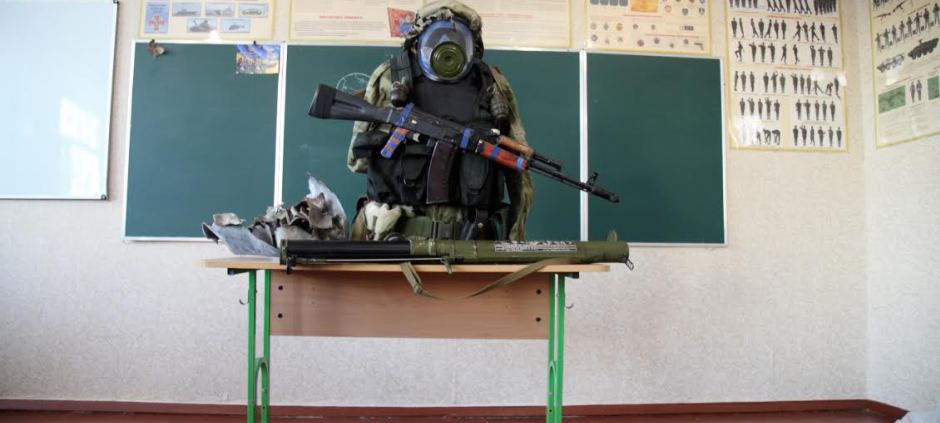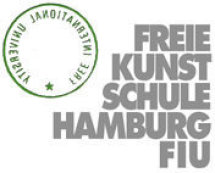Children and Soldiers
A project by Natalia Vorozhbyt, Georg Genoux and Theatre of Displaced People.
A documentary theatre and film production about living with war.
A documentary theatre and film production about living with war.
Since January 2016 the authors of this project have been travelling to small cities in the east of Ukraine that were severely damaged by the war. They have been working to establish contact between students from the local school and the Ukrainian soldiers who are stationed there as there is often very little communication between the two groups.
The children and soldiers talk to each other with remarkable openness. They talk about their fears, anger, courage and feelings about one another. In some cities the soldiers are called murders, in others they are worshipped as liberators from the “Russian occupation.”
The Theatre of Displaced People collective has, so far, staged live performances as part of the “Children and Soldiers” project in four frontline cities; Popasna, Shchastya, Nikolaevka, and Slaviansk.
Our goal is to bring it to every eastern Ukrainian town that has been involved in the war.
Ukrainian documentary filmmaker Liubov Durakova is working together with German director Georg Genoux on a film entitled “Children and Soldiers,” based on the live performances of the same title.
Authors of the project: Natalia Vorozhbyt and Georg Genoux.
Film: Georg Genoux and Ljubov Durakova.
On the theatre performances worked: Natalia Vorozhbyt, Georg Genoux, Alik Sardarian, Alexei Karathisnkij, Maria Khomyakova, Anastasia Pugatsh, Vasil Bilous, Molly Flynn.
The activity is supported by the Canada Fund for Local Initiatives.
Supported by the program Szenenwechsel by International Theatre Institute (ITI) and Robert Bosch Foundation.
Premiere: Perfromance Nr.1
Where is East? Children and Soldiers - Documentary Performance with high school pupils of Mykolaivkas’s School No.3 and Ukrainian soldiers.
28th January 2016, 18.00 at Teplitzia platform for contemporary art in Slavjansk.
Premiere: Performance Nr.2
At Full Volume – Documentary Performance with high school pupils of Popasna’s School No.1 and Ukrainian soldiers.
26th November 2016, 16.00 in the House of Culture, Popasna.
At Full Volume – Documentary Performance with high school pupils of Popasna’s School No.1 and Ukrainian soldiers.
26th November 2016, 16.00 in the House of Culture, Popasna.
Premiere: Perfromance Nr.3
Time - Documentary Performance with high school pupils of Mykolaivkas’s School No.3 and Ukrainian soldiers.
28th and 29th December 2016, 18.00 at Teplitzia platform for contemporary art in Slavjansk.
Premiere: Performance Nr.4
Happiness – Documentary Performance with high school pupils of Shasties’s School No.3 and Ukrainian soldiers.
Happiness – Documentary Performance with high school pupils of Shasties’s School No.3 and Ukrainian soldiers.
30th January 2017, 16.00 in the House of Culture, Shastie.
Press about Children and Soldiers:
"Documentary theatre has
developed from а niche experiment for a narrow audience to a definite trend that has notably evolved onstage practice at the heart of which are documentary interviews........The activity of Theatre
of Displaced People (the work of director Georg Genoux and playwright Natalia Vorozhbyt) played an important role in the development of this movement. The fundamental focus of this team has become
the war in the East of Ukraine and the fate of people who have fallen under the wheels of history. The activity of the Theatre of Displaced People has gone far outside the frame of theatrical form. It has also become
a centre of psychological adaptation for people from the East and Crimea as well as the envoy of peace in areas close to the conflict zone. Free from loud declarations and bathetic announcements, the
team has done much more in the matter of establishing dialogue and exhibiting loyalty to displaced people from Donbass than all the state programmes put together…"
"Ukrayinska Pravda" about Theatre of Displaced People."
"Ukrayinska Pravda" about Theatre of Displaced People."
Oksana Grytsenko about the performance in Popasna, 26th November 2016, in the Kiev Post:
“SOLDIERS AND CHILDREN PERFORM TOGETHER IN WAR-TORN DONBAS CITY
POPASNA, Ukraine
In an old Soviet concert hall with bas-reliefs of communist leaders lining the walls, a group of 17 children and four soldiers recall stories from their life to several dozen spectators.
One by one, the spotlight lights up teenagers and soldiers, who speak of their most memorable associations with sounds. They could be pleasant and calming, like the sound of a piano or purring of a cat, or scary, like the smashing of glass or the falling of a shell.
Alyona Filizhdynska, a 10th grade student, tells about the raw fear she once felt when her little brother abruptly went silent for a few minutes when they were both hiding in a bathroom from shelling.
At the end of this short monologue her mother and grandmother, who sit just in few meters from the stage, start crying and hugging Filizhdynska’s little brother, who is also present.
By the middle of the performance, which took place on Nov. 26, most of the spectators had eyes full of tears. The real stories of the people of Popasna over 30 months of Russian-instigated war had moved them more than any fictional play.
THEATER THERAPY
Popasna is a city in Luhansk Oblast, which had a pre-war population of some 22,000 residents. Located just 14 kilometers from separatist-held Pervomaisk, Popasna was especially heavily shelled earlier in the war.
Maryna Dunay, an 11th grade student, recalled during the play that she had missed her city greatly when she had to spend several months as an evacuee, when Popasna was under an intense period of shelling. When she eventually returned home, the familiar sound of shooting from Kalashnikov assault rifles seemed nice to her, because it signaled that she was back at home.
In the main hall of School No. 1 in Popasna, where all the children involved in the show are studying, the walls are covered with a photo exhibition of 36 portraits of local residents killed in the city during the war. The photos with the smiling faces of the dead are mixed with pictures of destroyed houses and large craters dug by shells.
The organizers of the show, German theater director Georg Genoux and Ukrainian screenwriter Natalia Vorozhbyt, say they chose to stage it in Popasna because this was one of the places most damaged by the war. They believe a joint performance by children and soldiers will help to both cure their psychological wounds, and break down mutual distrust between soldiers and the local population.
Psychological therapy is one of the main aims of their Theater of Displaced People, which they created in Kyiv in 2015. This theater has neither professional actors nor fictional stories. The “actors” are real people, including internally displaced persons from the Donbas and Crimea, as well as soldiers and people affected by war, telling true stories.
This truth is often extremely painful. During the play, one boy recalled his feelings when his father died after being severely beaten by Russian-backed separatists.
“Retelling a story helps a person to release it,” said Genoux. “So from a victim of your story, you eventually become a hero of your story.”
During lunch at the school’s cafeteria, where a two-course meal costs less than 20 cents, Genoux and Vorozhbyt said that teenagers who have seen the war are more compassionate than those living in the peaceful cities.
“They listen carefully, they support each other. There’s no bullying in this school,” Vorozhbyt said.
The teenagers who agreed to participate in this project were freed from their classes to talk to the director and the screenwriter about their personal experiences.
Genoux said there had been laughter and tears during these talks. He added that they choose for the show only those stories that the children are comfortable sharing with a big audience. “This is sacred for me and Natasha,” Genoux said.
SOLDIERS
When seven soldiers came to the school for the first meeting with Genoux and Vorozhbyt, they seemed cheerful but tense. They were wondering what parts they would be playing, and it took some time for the screenwriter to explain to them that there would be no fiction in this show.
Most of the soldiers had been fighting in the war from its very start in the spring of 2014, being members of the Kulchytsky National Guard Battalion, which was formed from former EuroMaidan activists.
They all speak Ukrainian and sometimes have trouble communicating with the residents of Popasna, where there is still a lot of pro-Russian sentiment. The soldiers, however, said that it was easier for them to find common ground with Popasna’s young people.
During the play, Sergiy Rodiakin, a young soldier from the city of Kalush in western Ukraine, told a story about his girlfriend, whom he met at the EuroMaidan when she was bringing hot tea to the protesters. She became his fiancé, and has waited for him over the years of war. He said it was hard for her to accept the fact that he had recently signed a permanent contract with the army.
Rodiakin said he hopes this joint play will “destroy the east-west contradiction.”
“They (the children) will tell their parents: mom, dad – I spoke to them, they (the soldiers) are just people like us,” Rodiakin said.”
The teenagers also shared their love stories – along with the memories of war, love was the second main topic of the play.
SCHOOL
Through a third-floor window of School No. 1, Viktor Shulik, the school’s principal, points to separatist-controlled territory, just a mile from the school building.
Meanwhile, in a school corridor, children from the 3rd grade weave a camouflage net for the military during break time.
The school was heavily shelled at the height of the fighting, and some parts of it are still undergoing repairs. Some 220 children study now there – two-thirds of the pre-war number.
Shulik said the sound of shelling is still often heard in the school, which is located on the outskirts of Popasna. The sounds often make children shudder, he said. But their teachers, who are predominantly women, shudder even more.
The principle came to see the performance, along with several other teachers. They all sat quietly in their seats during it.
The play ended to loud applause. Immediately after, the children and soldiers happily started arranging an after-show party. The teenagers also promised to visit the soldiers at their checkpoint. They had spent less than one week preparing the show, but by the time it was over, they all behaved like old friends.
Genoux said such plays don’t have a long life – once the participants stop “feeling” their roles, and start playing them, there is no sense in continuing.
But the idea will be reused in other places, in other times, he said.
In the coming months, the Theater of the Displaced People is planning to stage joint shows with children and soldiers in three other Donbas cities hit by war: Sloviansk, Mykolayivka, and Severodonetsk.”
(https://www.kyivpost.com/ukraine-politics/theater-of-reconciliation.html)
Huckmagazine, 23rd February 2017
Deutsche Welle, 30th December 12 2016
Institute Drama Blog, 18th February 2017
Beyond '91, 12th March 2017



